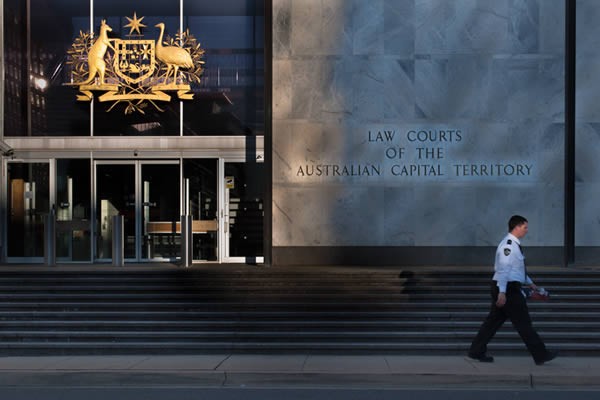
Currently courtroom evidence given by audio-visual link is recorded, while in-person evidence is not. Photo: File.
New legislation to give complainants in sexual, violent and family violence court matters the choice to have their in-person evidence recorded is a step closer, with an inquiry recommending the change be adopted into law.
However, several issues have been raised by stakeholders, particularly around consent.
The amendment to the Evidence (Miscellaneous Provisions) Act 1991 was introduced to the Legislative Assembly in November last year, which would allow evidence given by complainants in a courtroom in person to be recorded so it could be used again if the case needed to be retried.
The legal anomaly was picked up by Director of Public Prosecutions (DPP) Shane Drumgold SC, who represented Brittany Higgins during the trial of her accused rapist, Bruce Lehrmann.
In the days after the case ended in a mistrial, Mr Drumgold wrote to Attorney-General Shane Rattenbury stating that the law allowed for the recording of evidence given by a complainant appearing via audio-visual link (AVL) in an alleged sexual assault case, however, the same consideration wasn’t in place for complainants who gave evidence in person, which meant they would have to provide it again if the case needed to be retried.
“There appears no rational reason to treat witnesses who give evidence in the courtroom different,” Mr Drumgold wrote at the time.
A committee inquiry into the amendment received submissions from Women’s Legal Centre, the ACT Law Society, the Victims of Crime Commissioner, Legal Aid ACT, Department of Public Prosecutions and the Australian Federal Police Association.
An explanatory statement said the purpose of allowing evidence of an alleged victim to be recorded in court was to “reduce the risk of re-traumatising a vulnerable witness … if the witness consents to this process” should their evidence be needed again in a retrial.
But the issue of consent was raised by multiple stakeholders during the consultation process.
In its submission, the DPP was concerned about potential failures to seek recording consent, when the consent would be sought, whether consent needed to be sought for the recording to be replayed, and implications if consent was denied and then the witness became unavailable.
“[There’s] a significant risk of error in failing to seek such consent prior to recording it, which could effectively punish the complainant by excluding the prosecution’s ability to rely on that evidence for a subsequent proceeding, thus inadvertently forcing an [alleged] sexual assault complainant back into the witness box,” it wrote.
“A psychologically traumatised complainant may not wish for their evidence to be recorded due to the emotional trauma of the event, or a lack of appreciation of the prospects of a discharged jury or successful appeal at a first trial, but if the matter is overturned on appeal or a jury is discharged, the complainant may subsequently change their mind and wish for [the recording] to be played instead of giving evidence afresh.”
The ACT Law Society said it considered it “imperative” that “express, clear consent” be given by a witness before their evidence could be recorded.
Meanwhile the Victim of Crime Commissioner suggested an “opt out” approach which would take the onus of seeking consent off the prosecution, and could be applied to evidence given live in court, via CCTV or in a pre-recorded hearing.
“[It] should be reworded to create a presumption that the evidence will be recorded, unless the relevant witness withdraws their consent for the recording to occur,” it submitted.
“This ‘opt out’ approach would promote victim-survivor agency in the conduct of proceedings while minimising the risk of recorded evidence being inadmissible due to procedural oversight.”
It also suggested the Victims of Crime Act 1994 be amended to support victim-survivors to access information about their right to opt out of having their evidence recorded.
The Women’s Legal Centre also stressed victim-survivors should have access to legal advice when making the choice whether to have their in-person evidence recorded.
Overall, the committee found that while the bill’s intention was supported “in principle” and recommended the Assembly support it, the issues raised meant it felt the ACT Government should consult further with stakeholders, including people with lived experience.
“Given the overriding objective of the bill is to avoid re-traumatising complainants it is important to ensure that the legislative amendments work as intended,” it reported.
It also recommended the “opt out” approach be examined.
The report will now need to be considered by the Scrutiny Committee and the Assembly.




















